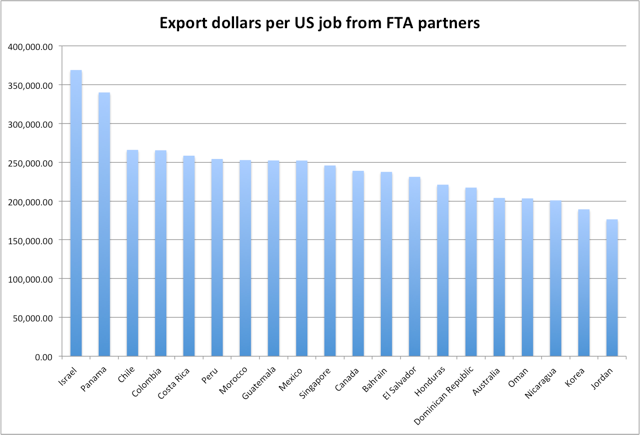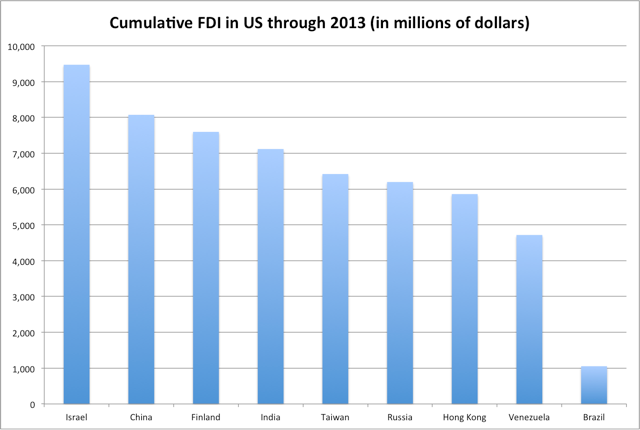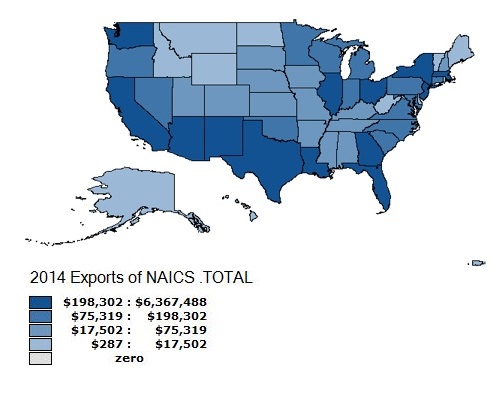From manufacturing to medical research, the Jewish state is crucial to the economic health of the U.S.
The movement to boycott, divest from, and sanction Israel (often referred to as BDS) hopes to economically isolate the Jewish state to the point that it is pressured into permitting the creation of a Palestinian state under conditions that would threaten Israel’s security and even its very existence. Those of us who fight against this support Israel’s right to exist and are usually motivated by religion, a specific worldview, or a moral code. But when boycotts hurt Israel’s economy, they hurt America as well. Israel makes massive and often unknown contributions to America’s economy and quality of life. If the boycott movement were to achieve its aims, Americans would lose regardless of their position on the Arab-Israeli conflict. In the last few presidential election cycles, the economy has ranked among the top two most important issues to voters, and this year will likely be the same. This means that this fight is much bigger than the pro-Israel community, and the coalition to fight boycotts of Israel should expand to include those concerned about American domestic policy as well. Americans needs to understand that this hurts them too.
The U.S.-Israel alliance is expansive. Pro-Israel advocates understand that the alliance contributes to America’s security and its position as a moral, democratic leader in the world. Decades of polling show Americans outside the foreign policy establishment support Israel because of the democratic, liberal values shared by our two nations. But the alliance is much deeper than that. As of December 2015, according to the World Bank, Israel is the 37th largest economy in the world by gross domestic product (GDP), an extraordinary accomplishment for such a young and perpetually beleaguered nation. But last year Israel was also America’s 23rd largest trade partner. From Israel, America receives unusually high amounts of investment; helpful and profitable technologies and services; and advancements in science, agriculture, the environment, and healthcare that improve the quality of and, in some cases, quite literally save our lives. Our exports to Israel create jobs in America. Through Israeli innovations and collaboration, our scientists and medical professionals become smarter and more effective at their jobs, and our agriculture and environmental sectors become more efficient and productive. The impact of the alliance is as wide as it is deep.
In the summer of 2014, the Israel Allies Foundation (where I am Director of Congressional Affairs) was planning the launch of a massive effort to combat the anti-Israel boycott movement through state legislatures. At the same time, we were considering what needed to be done in Congress to support that effort, so I convened a meeting with staff from six congressional offices, three Republican and three Democratic, several of them senior, and all of them pragmatic supporters of Israel and human rights. We talked about the inherent anti-Semitism that drives the movement, and concluded that the movement was doing and would continue to do more harm to the Palestinian cause than good. Above all, we agreed that it must be stopped.
Toward the end of the meeting, a staffer raised their hand and asked if there was any positive argument to be made against it—that is, is there more to combating boycotts than beating the anti-Semites and supporting Israel? Thus began a project that led to House Resolution 551, “Recognizing the importance of the United States-Israel economic relationship and encouraging new areas of cooperation.”
HRes 551 was introduced by Rep. Ted Lieu (D-Calif.), whose leadership attracted three very powerful co-sponsors: House Foreign Affairs Committee chair Rep. Ed Royce (R-Calif.), the committee’s ranking Democratic member, Rep. Eliot Engel (D-N.Y.), and the chair of the Subcommittee on Terrorism, Non-Proliferation, and Trade, Rep. Ted Poe (R-Texas). At the time of this article, it had attracted 81 co-sponsors and passed through the Foreign Affairs Committee unanimously.
The resolution notes a number of successes in the U.S.-Israel alliance:
• The U.S.-Israel free trade agreement (FTA) was America’s first FTA when it was signed on April 22, 1985.
• Over the following 30 years, trade has multiplied tenfold to over $40 billion annually.
• Through government-funded U.S.-Israel collaborative research and development programs in science, energy, agriculture, security, technology, and numerous other areas, America has become a more environmentally friendly, healthier, better fed, more advanced, and financially stronger nation. The lives of people in America and Israel have been tangibly improved because of the two countries’ alliance.
The reason Congress spent time on HRes 551 was simple: America derives critical and unique benefits from its economic relationship with Israel. The findings of the resolution lead to two important conclusions: First, the U.S.-Israel economic relationship matters. Second, targeting the Israeli economy also targets the American economy, with potentially devastating results that reach beyond economics and into basic quality of life. Understanding how this negatively impacts America’s economy becomes easy once the full extent of the economic connections between Israel and the US, and the benefits from them, are made clear. And once that understanding is reached, it becomes painfully obvious why every American should oppose boycotting Israel.
The U.S.-Israel alliance’s backbone is the two countries’ macroeconomic ties. America has FTAs with twenty countries. Through our exports to those countries, 17,638,294 American jobs were directly supported between 2009 and 2014, according to the Department of Commerce. Of that total, trade with Israel contributed 254,562, the eighth-largest contribution among the 20 trade partners. When the data is further examined, however, it turns out that exports to Israel generate the highest amount of export dollars per job.
While Israel’s economy does not offer the sheer volume of market opportunities for American products and services that FTA partner economies like Canada, Mexico, and Australia do, the quantity of export dollars generated by each American job supported by trade with Israel is far more significant than those larger economies on a per job basis. As demonstrated in the graphic below, US jobs supported by exports to Israel represent the highest value per job of any of the 20 free trade partner countries. This number is found by taking the dollar amount of trade between the U.S. and a given country, then dividing it by the number of jobs supported by that country.
One reason that U.S. jobs supported by exports to Israel provide so much bang for the buck is the nature of the goods and services provided. It is no secret that Israel has one of the most advanced economies in the world. The “Startup Nation” is among the world’s top innovators and its work touches the lives of people around the globe in nearly every imaginable sector: Mobile and computing technology and services, healthcare, food and agriculture, scientific research and development, water, environmental protection, and defense. And as citizens of an advanced nation, Israelis are also users of these advanced technologies and their applications. This makes the Israeli market ripe for the kind of exports that create and sustain high-paying jobs in America. The top American export categories to Israel by dollar value in 2014 are among those considered blue- and white-collar industries: Precious stones, electrical and mechanical machinery, aircraft, and optic and medical instruments.
Another reason high-paying American jobs are tied to trade with Israel is the amount of foreign direct investment Israel sends to America, which is primarily concentrated in the human capital-heavy manufacturing sector. According the Organization for Economic Cooperation and Development, Israel’s cumulative investments in the United States through 2013 are more than economic giants like China, India, Russia, Hong Kong, and Brazil, not to mention major oil producer Venezuela, mutual defense treaty partner Taiwan, and all of Africa’s individual countries. Inasmuch as foreign investment factors into American foreign policy, this consideration should rank higher for Israel than any of those countries, which is a striking statement when you consider how much leeway countries like China, India, and Russia in particular receive from our government on human rights concerns the boycott movement claims to care about.
We have data on the impact of the economic relationship with Israel on individual states as well. Every state in the union has its own economic ties to Israel. At the very lowest level of economic engagement, Alaska still did over $287,000 in trade with Israel as of 2014, not to mention the more than $2.7 million received in 2012 alone by the Alaska defense industry in purchases made through Foreign Military Financing (FMF) provided by the U.S. to Israel through bilateral assistance.
At the top end of state economic ties with Israel is New York, which enjoyed over $6.3 billion in trade with Israel in 2014, making Israel its fourth-largest trading partner. Five years prior, the state signed a memorandum of understanding with Israel that builds industrial cooperation and provides assistance to companies seeking financial support for research and development projects, while also establishing information and personal exchanges in nanotechnology, biotechnology, and security. Major companies operating in New York like GE and Eastman Kodak count Israel as an important market, while medical companies like J. Jamner Surgical Instruments consider Israel a key market because of the high value Israel places on providing quality health care to its citizens.
The 48 states between New York and Alaska have similar stories to tell: Profitable economic ties that sustain many jobs. This is one of the main reasons these states are adopting laws that prevent their taxpayer dollars from going to companies and pension investment funds that participate in anti-Israel efforts. Last year, South Carolina adopted the first law in the country that requires companies seeking contracts with the state to certify that they will not participate in boycotts, divestments, or sanctions on the basis of national origin for the duration of the contract.
South Carolina did over $120 million in trade with Israel in 2014, 22 percent more than the year prior. Several companies in the state received substantial business through FMF, including Zephyr International LLC, Woven Electronics, and North American Rescue. Terex Cranes sells construction cranes and lifts to Israel. Amida Industries exports its mobile floodlight towers and has a local agent located in the Jewish state. Carolina Steel and Wire Corporation, Kigre, Inc., and Clark-Schwebel Fiber Glass Corporation are just some of the more than 30 South Carolina companies who do business in Israel. The economic considerations are substantial enough to have compelled the state to protect these ties through public policy.
However, the South Carolina law is about more than just dollars and cents. It is an extension of the values of the state’s citizens, and this was one of the reasons why the Israel Allies Foundation launched its national effort to pass state-level anti-boycott laws in South Carolina. The scope of the South Carolina law covers national-origin discrimination and other categories like race and gender. Because it is not Israel-specific, the law makes clear that South Carolina is uncomfortable with the concept of discriminatory business practices in multiple contexts. The boycott-Israel movement is an inherently discriminatory movement because it targets Israel, the only Jewish state, on charges that are far more appropriately applied to other countries. The movement’s inherent racism is given away by its use, sometimes deceptive and other times plainly overt, of anti-Semitic arguments, tropes, and images, which belie its claims of seeking “justice.” The South Carolina law is at its core a means of protecting the state’s citizens from unwittingly supporting discrimination, and while it is most obviously applied to efforts against Israel, it is written so that it can be adapted to other discriminatory efforts.
Trade with Israel is crucial to many states’ economies, which explains why so many are passing laws to prevent boycotts from occurring.
Shortly after South Carolina Governor Nikki Haley signed the bill into law, Illinois Governor Bruce Rauner signed a bill that forbids state and local pensions from investing in parties who promote boycotting Israel. Illinois maintains ten foreign trade offices abroad, one of which is in Israel. At the 2015 Water Technology and Environmental Control Exhibition and Conference in Tel Aviv, the Illinois state government ran a pavilion to showcase Illinois companies. Illinois sent nearly $200 million worth of exports to the Jewish state in 2014. And, like South Carolina, the ties go deeper than money. In just one example, the University of Chicago signed a memorandum of understanding with Israel’s Ben-Gurion University in March of 2013 that formalized a number of joint research partnerships, including one that focuses on developing water production and purification technologies that can be sent to regions around the world where fresh water resources are lacking. The purpose of this U.S.-Israeli project is to combat what many predict will be one of the next, and extremely devastating global humanitarian challenges: Water scarcity.
It is quite telling that two very different states, liberal Illinois and conservative South Carolina, decided independently to enforce their citizens’ desire to oppose the bigoted practice of economic boycotts motivated by ethnic and religious discrimination. Shortly after the successful effort in South Carolina, the Israel Allies Foundation began laying the groundwork in Florida for passing what would be another historic step: A law that combined the contracting provision of South Carolina law with the pension provision of Illinois law. On February 24, Florida made history by passing it. This combination law is the strongest legal statement on the subject yet made by any government, state or federal. In 2014, Florida had the fourth-highest gross domestic product of any state, ranking one slot ahead of Illinois (South Carolina ranked 27th). Combined, these three states represent 18.5 percent of U.S. GDP. Their individual decisions to signal their support for Israel send a very strong collective message that anti-Israel movements must be combated.
The anti-discrimination movement will not end in Florida. Working with its partners, the Israel Allies Foundation has worked to introduce legislation in New York (over $6 billion in exports to Israel in 2014), California (over $2.3 billion), Georgia (over $250 million), Arizona (over $234 million), and Iowa (over $40 million). These states, combined with the three that have already passed laws, account for 32 percent of America’s trade and over 37 percent of U.S. GDP—and these are just the states that have gone public with their bills. At the time of writing, there are more in the works.
Congress and federal court rulings support what the states are doing. The Export Administration Act (EAA) of 1977 and the Ribicoff Amendment to the Tax Reform Act of 1976 were both explicitly designed to combat the Arab League’s boycott of Israel, and these acts extend to secondary and tertiary boycotts of firms doing business with Israel—as is being attempted today. The boycott-Israel movement’s main tactic is the politicization of America’s economic engagement with Israel, but the EAA is a particularly strong statement in support of depoliticizing U.S. trade. This sets the movement against official U.S. policy.
The findings and declarations contained in the EAA, which lay out the rationale and importance of the binding legal changes the law makes, echo sentiments that were critical to healing a broken Europe following World War II. They are as important for the world today as they were then.
During the first half of the 20th century, European countries implemented a variety of trade barriers and engaged in currency wars as a means of achieving political and military objectives. This was particularly the case in the 1930s. Franklin Roosevelt and Winston Churchill believed that these economic conflicts strongly influenced the drift toward world war. The two leaders thought that economic cooperation needed to be encouraged in order to avoid future conflict. Understanding that cooperative economics build cooperative politics, Roosevelt and Churchill conceived of a new global economic and trade system based on a single set of rules. This was something Palestinian Authority Prime Minister Salaam Fayyad attempted to do on a much smaller scale. He was supported in his endeavor by America and Israel until PA President Mahmoud Abbas forced Fayyad out of politics in early 2011. Unfortunately, neither Abbas nor the boycott-Israel movement understands this critical piece of statecraft.

Israeli Minister of Industry, Trade, and Labor Shalom Simhon (right) speaks at the 2011 World Trade Organization ministerial conference in Geneva. Photo: World Trade Organization / flickr
One of the key elements of Europe’s cooperative economics following World War II was the creation of the General Agreement on Tariffs and Trade (GATT) in 1947, which later became the founding document of the World Trade Organization (WTO). GATT explicitly de-linked trade from politics and conflict by requiring trading nations to follow the same free trade-oriented practices with all other GATT nations. Today, this includes all WTO nations, or put another way, practically the entire world. By requiring every nation to follow the same rules of trade, countries are severely limited in their ability to use trade to hurt other countries, making economics a force for peace among nations.
The EAA is clearly written with this GATT priority in mind. Its very first finding states, “the ability of the United States citizens to engage in economic commerce is a fundamental concern of United States policy.” Its very first declaration of policy is “it is the policy of the United States to minimize uncertainties in export control policy and to encourage trade with all countries with which the United States has diplomatic or trading relations, except those countries with which such trade has been determined by the president to be against the national interest.” With Israel being America’s longest-running free trade partner, efforts to put economic distance between the U.S. and Israel clearly contradict fundamental U.S. economic and foreign policy priorities.
The EAA and the Ribicoff Amendment ground anti-boycott laws like those in South Carolina, Illinois, and Florida in established federal law, while federal court decisions support their consistency with these laws. In 2004, a district court found in Karen Mar. LTD. v. Omar International, Inc. that “Congress enacted [the EAA] in response to the longstanding Arab boycott of Israel. Section 2407 [of the EAA] was intended to stop the secondary and tertiary boycotts that Congress considered detrimental to both the United States and Israel.” The ruling in 1983’s Bulk Oil A.G. v. Sun Co., Inc. states that the law was “specifically aimed at taking a ‘stronger stand’ on the problem of the Arab boycott of Israel and its impact on United States business.” This suggests that laws targeting other boycotts of Israel follow the spirit of the laws that targeted the Arab League boycott.
There are numerous precedents for upholding state-level laws that prevent boycotts of Israel.
Other court decisions make clear that these anti-Israel laws cannot be challenged on constitutional grounds, as boycott supporters have argued. The chief judge in 1975’s General Electric Corporation v. New York State Assembly Committee, Etc. wrote that the plaintiff’s free speech challenge to the State Assembly’s investigation into companies’ participation in boycotting Israel does “not merit extensive consideration. It is unclear to me how these investigations will impair rights of association and free speech as we regard those rights under settled law.” Briggs Stratton Corp. v. Baldrige stressed in 1984 that federal courts have found there is no First Amendment right “to answer questions asked by Arab boycott offices pursuant to the Arabs’ trade boycott of Israel,” whilblocke 1983’s Trane Co. v. Baldrige found that EAA Section 2407 “violates neither Fifth Amendment procedural or substantive due process rights, nor the Ninth Amendment rights, of American businesses.”
With states lining up to prohibit their tax dollars from supporting the anti-Israel boycott movement (sometimes known as BDS), and Congress’ recognition through HRes 551 that the economic relationship with Israel matters, the Israel Allies Foundation and its partners stressed the importance to Congress of taking the next step in showing its support. On February 10, 2016, Congressmen Bob Dold (R-Ill.) and Juan Vargas (D-Calif.) and Senators Mark Kirk (R-Ill.) and Joe Manchin (D-W.Va.) introduced the Combating BDS Act of 2016. Similar to the Comprehensive Iran Sanctions, Accountability, and Divestment Act of 2010, the Combating BDS Act authorizes state and local governments to pass these anti-boycott laws and protects them from federal preemption concerns.
Another level to the U.S.-Israel economic alliance, but no less important to it, are the three U.S.-Israel binational programs: the Binational Science Foundation (BSF), the Binational Industrial Research and Development Foundation (BIRD), and the Binational Agricultural Research and Development Foundation (BARD). These programs were started in the 1970s by the American and Israeli governments with the initial goal of strengthening the U.S.-Israel alliance through fostering Israel’s then-nascent technology industry. The three programs have been more than successful in meeting this goal, helping to lay the foundation for Israel’s success as one of the world’s leading scientific, industrial, and technologically advanced nations. They have also accelerated advances in similar industries in America. These programs receive equal funding from both countries and then distribute those funds through competitive processes into joint American and Israeli research and development efforts. The results have been staggering, and they have undoubtedly contributed to better quality of life—including basic life expectancy—around the world, in addition to driving American and Israeli societies forward.
The BSF funds nonprofit collaborative research by U.S. and Israeli scientists that can become the basis for commercially viable technological developments. Grants are made through a peer-reviewed process juried by leading scientists from around the world. Thirty-eight Nobel laureates have received BSF funding. In 2004 alone, six of eight Nobel Prize winners were BSF grantees. That year, the Nobel Prize for Chemistry was awarded to Avram Hershko and Aaron Ciechanover of the Technion—Israel Institute of Technology and Irwin Rose of University of California, Irvine (incidentally, a bastion of the anti-Israel movement) for their BSF-funded discovery of the ubiquitin system for protein degradation, which opened up new research opportunities on cancer treatments, neurodegenerative disorders, and more. Two of BSF’s projects, an algorithm that has revolutionized online auctions and advertising, and the Positron Emitting Tomography, a diagnostic tool that identifies cancer, have had such commercial success that they’ve paid for the entire BSF program several times over. According to a 2011 Economic Strategy Institute (ESI) study on the three binational programs, scientists in 47 of America’s 50 states, plus Puerto Rico, had received BSF grants.

Nobel Prize laureate Avram Hershko delivers the keynote speech at the convocation ceremony at the Hebrew University of Jerusalem. Photo: Rebecca Zeffert / Flash90
The BIRD Foundation promotes non-defense industrial research and development jointly conducted by Israeli and American companies with an eye toward commercialization. Different from BSF and BARD, if a BIRD project is successful and generates revenue, the grant must be repaid by the recipients. As of 2011, the ESI study found that 384 of the 826 BIRD-funded projects have been repaid, representing about a third of the total amount invested. Return on BIRD’s total investment was 600 percent as of 2011, while recipients of BIRD funding were spread across 41 states.
BIRD successes abound. One BIRD-funded project contributed to the creation of the digital signal processing chips that have become essential to a wide variety of electronic products, including the multibillion-dollar digital camera industry. Another American corporation turned a $675,000 grant in 1992 into annual sales of $100 million, profits of $20 million, and over 500 jobs. All told, BIRD-sponsored projects have produced over $5 billion in global sales and $100 million in tax payments to the US government. BIRD has had several medical successes as well. One is the development of Krystexxa, a drug that treats chronic gout in adult patients. Another is a joint project between the pharmaceutical company Kamada and the American Red Cross (a member of the historically anti-Israel International Committee of the Red Cross) that produced a breakthrough on treatment of Alpha1 Antitrypsin Deficiency, a genetic disorder that causes lung and liver disease.
In 2007, Congress passed the Energy Independence and Security Act, which included funding for BIRD to expand its work into the energy sector, creating BIRD Energy. The program provides matching financial contributions from the U.S. and Israeli governments for joint U.S.-Israel private sector energy research and development. Projects have thus far focused on energy efficiency, hydroelectric energy production, lowering energy consumption in water treatment, energy optimization in manufacturing, wind energy storage, fuel efficiency, carbon dioxide emissions reduction in tractor-trailers, and noise control for distributed power generation.
Israeli-American programs like the BSF, BIRD, and BARD greatly contribute to the economy and welfare of both nations.
The BARD program competitively funds and promotes collaboration by U.S. and Israeli scientists on agricultural research and development projects that aim to increase agricultural productivity and emphasize plant and animal health, food quality and safety, and environmental issues. Although commercialization is not a factor in BARD grant-making, ten BARD projects, with a total BARD investment of $2 million, have resulted in $1.7 billion in economic benefits to the U.S., according to the ESI study.
Other successful BARD projects include the development of a machine that screens for a wider variety of pesticides and chemicals in food, which allows government agencies to maintain security of the food supply; a zero-discharge intensive aquaculture system for fresh and sea water fish that prevents environmental pollution (two have already been built in New York and Washington state); a preservation method for the transport of cut flowers that reduces costs and environmental impact; the creation of a database for cows that allows farmers to optimize breeding; and genetic mapping of fruit so scientists worldwide can study aroma, taste, and quality. Want to know why tilapia fish has shown up on nearly every restaurant menu and grocery seafood section? The answer is in large part a BARD-funded project that researched selective breeding in tilapia that helped launch the industry in America. The ESI study found BARD recipients in 47 U.S. states and Puerto Rico.
According to the ESI study, “a very conservative estimate of the historic number of jobs created in the United States by the investments of the [three] binational foundations is 18,000-50,000. But it could well be in the 200,000 or more range.” The study found that total economic benefits to the United States totaled $7.7 billion, and $700 million in tax revenue for the U.S. government. Researchers will be hard pressed to find better-performing federally-funded projects.
All things considered, one would be hard-pressed to find an alliance more effective than the one between the United States and Israel. The Jewish state is a small country in population and size, but the benefits America realizes from its trade and collaboration with Israel are often comparable to much larger and wealthier nations, and in some cases may even exceed them. From individual states to the national economy, Israel’s impact is outsized: Hundreds of thousands of jobs, technological improvements, and science and healthcare advances that boost our material and physical quality of life.
Looked at this way, it becomes easy to see that the BDS movement’s attack on Israel’s economy, not to mention its encouragement of academic and scientific boycotts, directly hurts Americans. Just as the movement claims to be helping the Palestinians, but in fact harms Palestinian interests, it also harms what is perhaps America’s most important interest: its economic success. Regardless of your position on the Israeli-Palestinian conflict, if you support a stronger American economy and workforce, you should oppose boycotting Israel. It is important for Americans to know this, and for the anti-boycott effort to expand to include them.
![]()
Banner Photo: Yaakov Naumi / Flash90








